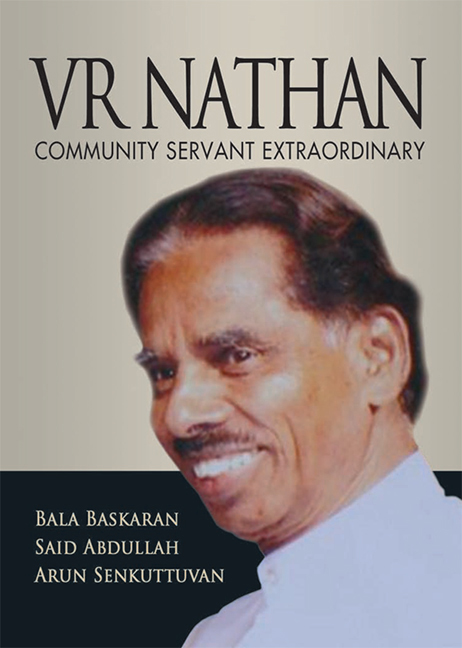Book contents
- Frontmatter
- Contents
- Foreword
- Message
- Preface
- Acknowledgements
- 1 VR's Inter-religious Leadership
- 2 An Immigrant who Made Good
- 3 Introduction to Temple Management Affairs
- 4 Invitation to Help out HEB
- 5 An Era of Change in HEB
- 6 VR's Signal Contribution to HEB's Transformation
- 7 Celebrating Hindu Festivals
- 8 Transforming the Temple Scene
- 9 VR's Views in Public Deliberations of Issues Affecting Indians
- 10 VR's Legacy
- Appendix
- About the Authors
- Plate section
10 - VR's Legacy
Published online by Cambridge University Press: 21 October 2015
- Frontmatter
- Contents
- Foreword
- Message
- Preface
- Acknowledgements
- 1 VR's Inter-religious Leadership
- 2 An Immigrant who Made Good
- 3 Introduction to Temple Management Affairs
- 4 Invitation to Help out HEB
- 5 An Era of Change in HEB
- 6 VR's Signal Contribution to HEB's Transformation
- 7 Celebrating Hindu Festivals
- 8 Transforming the Temple Scene
- 9 VR's Views in Public Deliberations of Issues Affecting Indians
- 10 VR's Legacy
- Appendix
- About the Authors
- Plate section
Summary
What VR lacked in terms of formal education, he made up by working harder than any of his colleagues. He took all the training courses the bank had to offer. He topped the class in a Dale Carnegie course. He learnt to speak a few new languages as an adult. He never ate lunch alone. He never turned down a social invitation from anyone, especially colleagues. He was never active in the employees’ union. He was loyal to his boss. Bosses trusted him. Promotions were bestowed on him. He specialized in organization and methods because he was asked to. He always believed bosses knew best. His job was to execute their orders to the best of his ability. While rising up the ranks in the bank, he never neglected his family responsibilities. He was known for his filial piety and he supported several relatives.
His approach to life was the same in retirement. He remained the caring head of his family that he always was and a faithful friend to a number of people he had met. There was one friend he met while nearing retirement who was to become his boss/mentor for life – SR. That relationship more or less defined all the service he rendered to the temples he was associated with, his community and the nation. He was happy doing whatever he was asked to do. He perhaps did it more diligently and faithfully than anyone else might have.
The first assignment that SR gave him was to clean up the accounts of HEB which he did. The next was the overall management of the four temples and some oversight of other Hindu temples. He did that too – in the same way he functioned at the bank. He made the four temples excellent service centres, with constant product and service innovation. Never mind that in the process the whole ambience of the temples changed from being – for more than a hundred years – quiet places of worship and contemplation for most days of the month for eleven and a half months of the year to one of gaiety and crowded celebrations almost every day of the year. One result was the temples could frequently be refurbished, renovated or rebuilt. The other result was that they all had surpluses by the end of the nineties so that SR could channel some of them to charities.
- Type
- Chapter
- Information
- VR NathanCommunity Servant Extraordinary, pp. 130 - 133Publisher: ISEAS–Yusof Ishak InstitutePrint publication year: 2012

